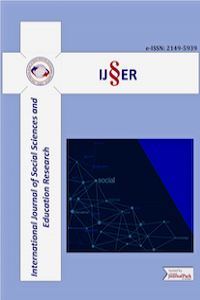Torture, violence and apartheid in André P. Brink’s A Dry White Season
André P. Brink, A Dry White Season, Torture; Apartheid South Africa,
___
- References
- Ayling, R. (2000). André (Philippus) Brink. In Scanlon, P. A. (ed.), South African Writers. Vol. 225 Detroit: Gale Group. Retrieved from: URL: http://go.galegroup.com/ps/i.do?&id=GALE%7CH1200009384&v=2.1&u=dumlu&it=r&p=LitRC&sw=w
- Brink, A. (1998). Literature as Cultural Opposition. In: Reinventing a Continent: Writing and Politics in South Africa. (pp. 185-202). Cambridge, Mass.: Zoland Books.
- ––––––– (June 1980). “Censorship and the Author”. Critical Arts (1) 2, (pp. 16-26).
- ––––––– (1979). A Dry White Season. London: W. H. Allen.
- ––––––– (Winter 1996). Reinventing a Continent: Revisiting History in the Litera-ture of the New South Africa: A Personal Testimony. In World Literature To-day (70) 1, (pp. 17-23).
- ––––––– (July 1999). Interview with André Brink interviewed by Felicity Wood. In: Southern African Journal of English Studies (18) 1, August 2007: (pp. 112-21). Retrieved from: DOI: 10.1080/10131750185310111.
- ––––––– Articulating the Inarticulate. In Ewald M., Michela B., and Karin O., (eds.), Trauma, Memory, and Narrative in South Africa: Interviews. (pp. 3-18) Am-sterdam: Rodopi:
- Diala, I. (Winter 2002). The Political Limits of (Western) Humanism in André Brink’s Early Fiction. Studies in the Novel, (34) 4: (pp. 422-447). Retrieved from: DOI: 10.1080/0305707032000135888.
- ––––––– (December 2003). André Brink and the Implications of Tragedy for Apart-heid South Africa. Journal of Southern African Studies, (29) 4, (pp. 903-919).
- ––––––– (June 2006). André Brink and Malraux. Contemporary Literature, (47) 1, (pp. 91-113).
- Jolly, R. J. (1996.) Colonization, Violence, and Narration in White South African Writ-ing: Andre´ Brink, Breyten Breytenbach, and J.M. Coetzee. Athens, Ohio: Ohio University Press.
- Karolides, N. J. (2006). Banned Books: Literature Suppressed on Political Grounds. Revised Edition, New York: Facts on File.
- Kossew, S. (1996). Pen and Power. A Post-Colonial Reading of J.M. Coetzee and Andre Brink. Amsterdam, Atlanta GA: Rodopi.
- Maynard, K. K., Kearney, J., and Guimond, J. (2010). Revenge versus Legality: Wild Justice from Balzac to Clint Eastwood and Abu Ghraib. Abingdon, Oxon: Birk-beck Law Press.
- Yayın Aralığı: Yılda 4 Sayı
- Başlangıç: 2015
- Yayıncı: Mahmut DEMİR
Akademisyenlerin tükenmişlik düzeylerinin demografik değişkenler açısından incelenmesi
Rıza Demir, Erman Türkmen, Altan Doğan
Venedikt Yerofeyev’in “Moskova-Petuşki” adlı eserindeki İncil yansımaları
Türk yazılı basınında “Başkanlık Sistemi” tartışmaları
Nurettin Güz, Hayrullah Yanık, Ceren Yegen
Öteki kimliklerle birlikte yaşayabilme olanakları üzerine: Çanakkale İli örneği
Ortadoğu uygarlıklarında vergi uygulamaları
Osman Sirkeci, Mohamad Sami Abdula
Sağlık Bilimleri Fakültesi Hemşirelik Bölümünde eğitim gören öğrencilerin öğrenme biçemleri
Hayriye Ünlü, Saniye Taşkın, Nalan Özhan Elbaş
0-6 Yaş çocuğu olan ebeveynlerin babalık rolüne ilişkin görüşleri
